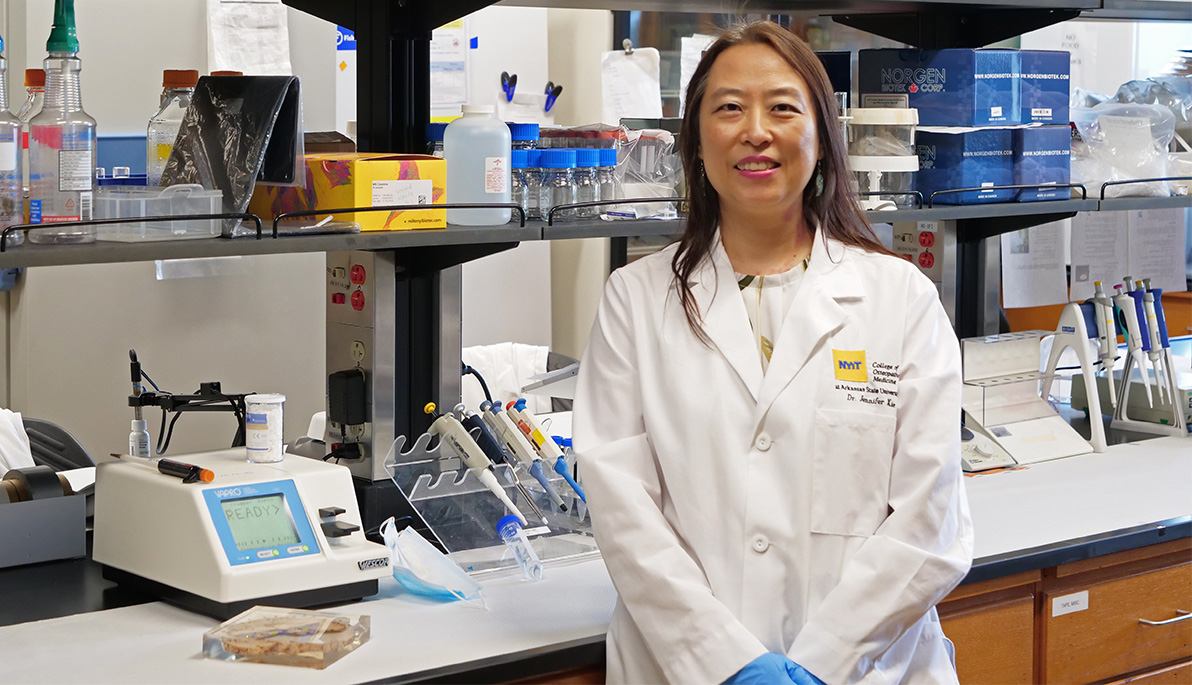
NYITCOM-Arkansas Receives Its First NIH Grant
August 4, 2020
Pictured: Assistant Professor Jennifer Yanhua Xie, Ph.D., received a $428,400 multi-year NIH grant to investigate whether Osteopathic Manipulative Treatment can help relieve migraines.
In late July, NYITCOM-Arkansas received its first grant from the National Institutes of Health (NIH). Jennifer Yanhua Xie, Ph.D., assistant professor of basic sciences at NYITCOM-Arkansas, received a $428,400 multi-year NIH grant to investigate whether Osteopathic Manipulative Treatment (OMT) can help relieve migraine headaches.
OMT is a set of hands-on techniques used by osteopathic physicians (D.O.s) to diagnose, treat, and prevent illness or injury. Using OMT, a D.O. moves a patient’s muscles and joints using techniques that include stretching, gentle pressure, and resistance.
When Xie arrived at NYITCOM-Arkansas in 2017, the OMT techniques used by faculty and medical students caught her attention. Xie’s research mostly uses rodent models to identify and test potential treatments for human chronic pain, intending to find effective, non-opioid therapies. OMT, which can be used as a non-addictive treatment for pain management, seemed like the ideal therapy for her next project.
The new NIH-funded study will take place over three years, with Xie working closely with Regina Fleming, D.O., assistant professor and chair of the Department of Osteopathic Manipulative Medicine at NYITCOM-Arkansas, as well as NYITCOM medical students. The team will replicate migraine-like symptoms in rats by injecting Complete Freund‘s Adjuvant, a substance that causes mild neck inflammation, as well as umbellulone, a volatile molecule that triggers head pain. This “double hit” strategy will allow the researchers to replicate the migraines caused by nasal irritants in susceptible patients with neck discomfort. Then, to relieve the rodents’ symptoms, Fleming and the medical students will apply OMT. The group will monitor for changes in biomarkers (molecules found in blood, fluid, or tissue sample) to indicate whether a migraine is present and how well the OMT relieved symptoms.

Assistant Professor Regina Fleming, D.O., will work with a team of NYITCOM-Arkansas students to replicate migraine-like symptoms in rats and then apply OMT to relieve the rodents’ symptoms.
“The results from these studies will be highly significant because they will provide a strong neurobiological rationale for using OMT to manage migraines,” Xie said. “Our project is innovative because we use a preclinical model that replicates aspects of human migraine pathology. These aspects include well-accepted biomarkers and clinical-relevant data, which increases the confidence that our approach will also be effective when applied to humans.”
The grant excites not only Xie and her fellow researchers, but also NYITCOM-Arkansas Site Dean Shane Speights, D.O., who noted that the funding is a milestone for the field of osteopathic medicine.
“We are grateful to the NIH for sponsoring this very important research, and we’re very proud of Dr. Xie for her innovative work,” said Speights. “While Osteopathic Manipulative Treatment has been used to provide significant medical benefits to patients in an array of areas, OMT research projects rarely receive this type of funding at this level. We’re pleased to see the federal support this project is receiving, and we greatly anticipate the opportunity to examine the results.”

By Casey Pearce
More Features

An Alumnus’ Commitment to the Environment
As an energy management graduate from New York Tech’s Vancouver campus, Jasdeep Gulati (M.S. ’22) is highly invested in educating people about environmental and climate sustainability.

Vancouver Faculty Win University-Sponsored Research Awards in New Program
The new Global Impact Research Grant (GIRG) program has been developed to keep Vancouver-based faculty connected to faculty and research projects being conducted on the university’s New York campuses.

Studying Climate Change One Degree at a Time
Junhua Qu (M.S. ’24) began her collegiate journey in Beijing. But, her interest in climate change took her to New York Tech’s Vancouver campus to study energy management.